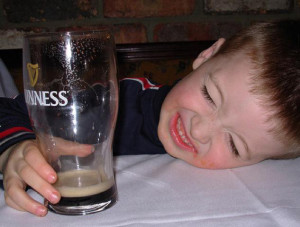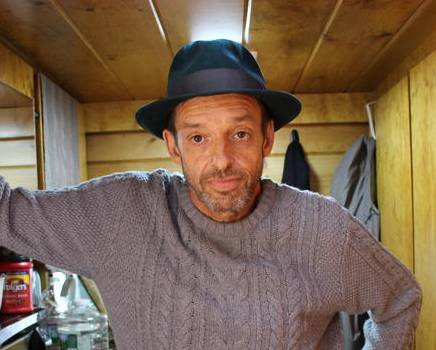 Back when I was a boy, or slightly before, a group of drunks at Chase’s Tavern on Liberty Street in Baltimore found a solution. On April 5, 1840, six drinking buddies sick and tired of feeling sick and tired, formed a total abstinence group, the Washington Temperance Society (later the “Washingtonian Total Abstinence Society” or the Washingtonians.) They’d grown tired of church-based temperance organizations preaching about the evils of liquor – instead, the Washingtonians banded together to support each other. Much like AA meetings today, this band of besotted brothers met and shared stories of drunkenness and recovery. No religion, no politics, no creeds; just one alcoholic establishing identification and rapport with others and providing support to stay sober. Their thirst for fellowship was able to overpower their thirst for alcohol.
Back when I was a boy, or slightly before, a group of drunks at Chase’s Tavern on Liberty Street in Baltimore found a solution. On April 5, 1840, six drinking buddies sick and tired of feeling sick and tired, formed a total abstinence group, the Washington Temperance Society (later the “Washingtonian Total Abstinence Society” or the Washingtonians.) They’d grown tired of church-based temperance organizations preaching about the evils of liquor – instead, the Washingtonians banded together to support each other. Much like AA meetings today, this band of besotted brothers met and shared stories of drunkenness and recovery. No religion, no politics, no creeds; just one alcoholic establishing identification and rapport with others and providing support to stay sober. Their thirst for fellowship was able to overpower their thirst for alcohol.
 The Washingtonians did amazingly well, growing like crazy throughout the country, eventually documenting about 150,000 recovered alcoholics. By 1842, when Abraham Lincoln spoke to the Springfield, IL, Washingtonian group, meetings were being held in every city and most towns up and down the eastern seaboard. Unfortunately, the group lost its focus, spreading its message and methodology into suffrage, education reform and the abolition movement. By 1847, a mere seven years after they’d begun, the Washingtonians had devolved into a spent force, many of its early leaders having made money through speaking engagements and later converts returning to drink. Still, they’d shown a way – some would say THE way – for alcoholics to recover – through identification and group support.
The Washingtonians did amazingly well, growing like crazy throughout the country, eventually documenting about 150,000 recovered alcoholics. By 1842, when Abraham Lincoln spoke to the Springfield, IL, Washingtonian group, meetings were being held in every city and most towns up and down the eastern seaboard. Unfortunately, the group lost its focus, spreading its message and methodology into suffrage, education reform and the abolition movement. By 1847, a mere seven years after they’d begun, the Washingtonians had devolved into a spent force, many of its early leaders having made money through speaking engagements and later converts returning to drink. Still, they’d shown a way – some would say THE way – for alcoholics to recover – through identification and group support.
Today, as in 1840, 1900, 1920 or 1980, getting sober is hard for an alcoholic; staying sober is nearly impossible without some kind of active program of recovery. When I got sober back in 2007, I was lucky enough to find a ready-made and healthy group of people who’d overcome their alcoholism. Living in a shelter for homeless veterans in Nashua, NH, I was within a 45-second walk of a noontime meeting of such folks. Today, in larger cities in southern New Hampshire, such groups exist under the banners of Alcoholics Anonymous, Smart Recovery and the Three Principles. Not everyone is so lucky.
Once you get north of Concord, the population density gets lower and lower, so the recovery community gets sparser and sparser. During my nine months in Pittsburg, I’d drive 45 minutes each way, twice a week, to attend meetings in Colebrook. As a man who recognizes my need to be part of a community, this was second nature to me, but consider the case of the person new in recovery or, even harder, the one who has a hankering to quit drinking but no knowledge of how to do so. Unless he or she has a driver’s license, a car, the means to pay for extra gas and a fair amount of free time, the hope for recovery becomes pretty dismal. I mean, one of the first signs many alcoholics see of their need to quit drinking comes in the form of blue lights in the rearview mirror signaling a DUI and concomitant loss of license and with it, due to loss of transportation, potential loss of job. The drunk in Pittsburg (or Columbia or Milan or any other small town in New Hampshire’s North Country) is often stuck with no solution but to keep on drinking. Given the natural tendency of the later-stage alcoholic to isolate, many North Country alcoholics dive deeper into the bottle rather than seeking help. I know I would have.
This past week I spent three days in Berlin at the Hope for New Hampshire Recovery program, a support center for folks in recovery or those with a hankering to do so. Support meetings of various kinds are held there, and the center offers a clean and sober space for hankerers to hang. The Hope center in Manchester, a city with about 20 times the population of Berlin, hops and hums with activity, while the Berlin center is slower paced and less active. Still, a message of recovery is available there, and I’d like to pass on a couple pieces of information about it:
- Saturday, June 30, from Noon to 4 p.m., the Berlin Hope center hosts a block party for the community and for anyone who’s interested. Food, music and a dunking tank will be available. If you live in the North Country or if you’ll be traveling through, please stop by and demonstrate your support for Hope and for the hope of recovery.
- If you’re working a solid program of recovery, are a college graduate, have a desire to help save lives and transform people, and would like to relocate to the Berlin area, please give me a call at (603)361-6266. We’re looking for a center manager, and you might be that person.
Regular readers of this column know of my great regard for Abraham Lincoln, and here again he demonstrated, in the speech referenced above, an understanding far ahead of his time. In talking about drunkards, Lincoln said, “In my judgement, such of us as have never fallen victims, have been spared more by the absence of appetite, than from any mental or moral superiority over those who have.” The thirst I feel for alcohol is fundamentally different from that of the social drinker or the teetotaler. While I will never know that normal thirst, I have found a way to escape the bondage or that which I feel.
 Keith Howard used to run alternative schools and an improvisational theater until he had the chance to drink the way he’d always wanted to. By 2007, Howard was hopeless and homeless and toothless. While implementing a suicide plan — waiting for a bus to take him to his jumping-off point, he experienced a moment of clarity, went to the VA Medical Center in Manchester, and said, “Hi. I’m a veteran named Keith, and I don’t want to be alive anymore.” After detoxing, he was introduced to a program of recovery that remains central to his life. Eleven years sober now, Howard was director of Liberty House, then lived for nine months in a six-by-12-foot converted motorcycle trailer in Pittsburg, NH, a few miles from the Canadian border. Today, he is back in an undisclosed Manchester location, working for Hope for NH Recovery, maintaining his website (tinywhitebox.com) and writing. Howard still lives in the tiny space, although that appears the only box he is able to stay inside of.
Keith Howard used to run alternative schools and an improvisational theater until he had the chance to drink the way he’d always wanted to. By 2007, Howard was hopeless and homeless and toothless. While implementing a suicide plan — waiting for a bus to take him to his jumping-off point, he experienced a moment of clarity, went to the VA Medical Center in Manchester, and said, “Hi. I’m a veteran named Keith, and I don’t want to be alive anymore.” After detoxing, he was introduced to a program of recovery that remains central to his life. Eleven years sober now, Howard was director of Liberty House, then lived for nine months in a six-by-12-foot converted motorcycle trailer in Pittsburg, NH, a few miles from the Canadian border. Today, he is back in an undisclosed Manchester location, working for Hope for NH Recovery, maintaining his website (tinywhitebox.com) and writing. Howard still lives in the tiny space, although that appears the only box he is able to stay inside of.







